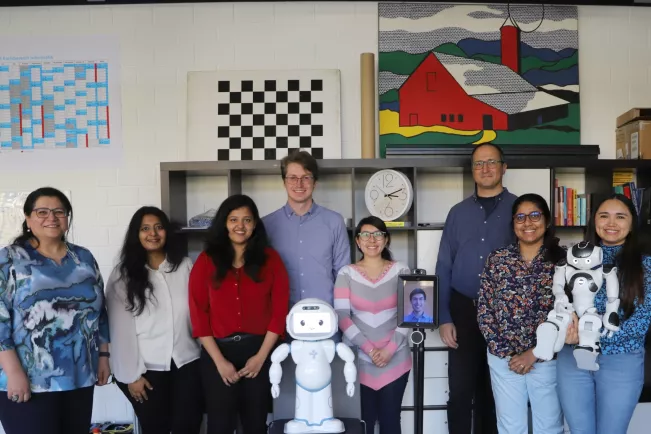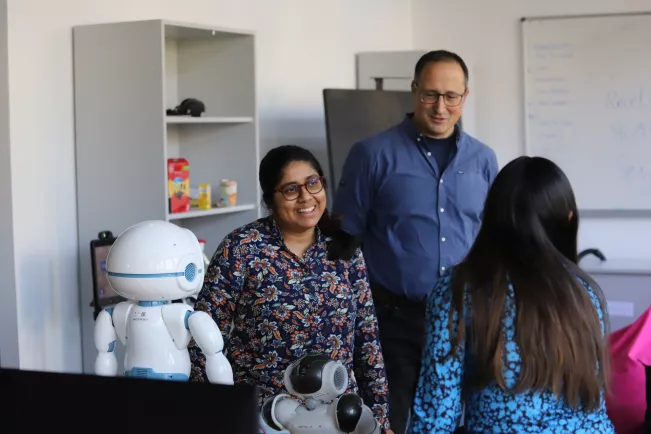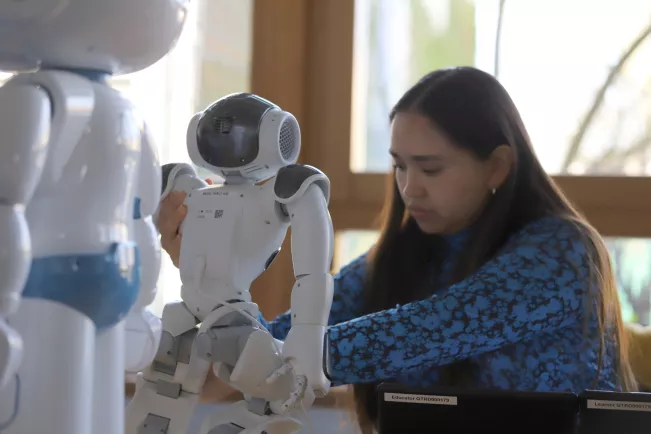Communications and Marketing
H-BRS founds "Rhine-Ruhr Center for Assistive Technologies" with other universities

Therapy robots train motor skills with stroke patients, educational robots interact with autistic children, care robots remind senior citizens to take their medication: The range of digital helpers for vulnerable groups is now huge - and demand is likely to increase further in view of demographic change and the shortage of skilled workers. There are currently around 7.8 million severely disabled people living in Germany, and a further 2.7 million with a slight officially recognized disability.

Hassan: Interactive understanding is new
The development of the current assistance systems focused on technical aspects. The researchers at ZAT Rhine-Ruhr now want to go one step further. "We are interested in the question of how assistance systems can be adapted to human needs," says Professor Teena Chakkalayil Hassan, who is responsible for the project at H-BRS. "This interactive understanding is new." The aim of the project is to advance the development of personalized assistance systems.
The type and manner of assistance should be adapted
The current generation of assistive robots does not take into account foreseeable changes in users due to learning, ageing or illness - for example, the loss of hearing on the one hand or the recovery of motor or verbal skills after a stroke on the other. In the ZAT Rhine-Ruhr project, the researchers now want to take these into account and automatically adapt the type of assistance and communication of the digital helpers to the individual needs of the users. The systems are intended to support people in everyday tasks that require cognitive abilities; they exhibit intelligent behavior and can be based on artificial intelligence.

Building a platform on the Internet
In addition to the joint development of innovative assistance systems with the help of decentralized structures, the interdisciplinary team from the four universities wants to set up a center as a platform on the Internet. In this way, transfer opportunities are to be created, for example by simplifying the networking of researchers and associations. The platform will provide interested parties and those affected with information about current research projects, but will also enable them to interact with researchers in order to provide valuable advice. Users can also provide feedback on the new developments during test runs in the planned mobile "technology cafés". Workshops and symposia are also planned to promote networking and further development, particularly among young researchers in the field. "The focus is on people," emphasizes Professor Hassan. "Our project is a promise for the future."
Thinking technical and social development together
"Digital assistance systems will become more important in our ageing society," adds Professor Remi Maier-Rigaud, Vice President Research and Junior Academics. "Our researchers show how technical and social development must be thought of and designed together. This is the only way to achieve acceptance among users. We look forward to working with our partner universities in the new Assistive Technologies Center," continues the university's Vice President.
H-BRS is responsible for the topic of trustworthiness
Within the research network, H-BRS is responsible for the topic of trustworthiness of pro-adaptive cognitive assistance systems, i.e. data security and the protection of privacy in addition to functional security. H-BRS computer science professor Luigi Lo Iacono's research focuses on these areas: "This involves personal and possibly sensitive data, which is why we have to be particularly careful," emphasizes Professor Hassan. The university is also contributing several laboratories from the fields of service robotics, artificial intelligence and human-centered privacy as well as the Center for Ethics and Responsibility. It wants to develop concepts for ethical and data protection standards.
Dean Alda: Emphasizing interdisciplinarity
"The high degree of interdisciplinarity of the various researchers and groups within this research network is particularly noteworthy," adds Professor Sascha Alda, Dean of the Department of Computer Science at Bonn-Rhein-Sieg University of Applied Sciences. "This special constellation enables the holistic development of digital assistance systems, which clearly sets us apart from comparative projects."
Artificial intelligence and autonomous systems are a focus of research
The future topics of artificial intelligence and autonomous systems are a research focus at H-BRS. Research, teaching and transfer are bundled in the Institute for AI and Autonomous Systems (A2S), which was founded at the beginning of 2023. Its director is Professor Teena Chakkalayil Hassan, who is an expert in the field of social interaction between humans and robots. Among other things, the researcher is working on assistance systems to improve people's quality of life.
Press photo:
Group photo with team and robots (from left): : Iman Awaad, Swathy Satheesan Cheruvalath, Oviya Rajavel, Michal Stolarz, Paola Rangel Robles, Jordan Schneider (auf Telepresence Roboter), Luigi Lo Iacono, Teena Chakkalayil Hassan und Natalia Quiroga Perez. The robots in the picture from left to right: QTrobot, Double Telepresence Robot, NAO. Photo: Juri Küstenmacher/H-BRS
Kontakt

Location
Sankt Augustin
Room
C 216
Address
Grantham-Allee 20
53757 Sankt Augustin
Telephone
+49 2241 865 9608
Daniela Greulich
Deputy Head of executive department Communications and Marketing/Press and Public Relations, Press Officer
Location
Sankt Augustin
Room
E 237
Address
Grantham-Allee 20
53757, Sankt Augustin
Telephone
+49 2241 865 641Links
Weiterführende Links
